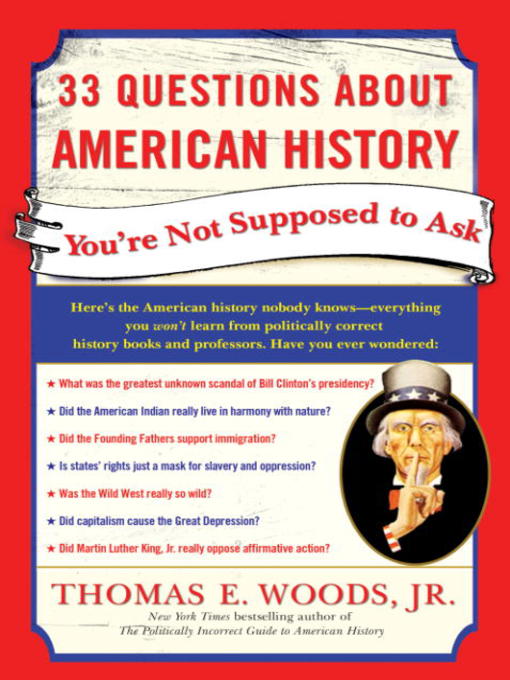Surprised? Don’t be. In America, where history is riddled with misrepresentations, misunderstandings, and flat-out lies about the people and events that have shaped the nation, there’s the history you know and then there’s the truth.
In 33 Questions About American History You’re Not Supposed to Ask, Thomas E. Woods Jr., the New York Times bestselling author of The Politically Incorrect Guide to American History, sets the record straight with a provocative look at the hidden truths about our nation’s history—the ones that have been buried because they’re too politically incorrect to discuss. Woods draws on real scholarship—as opposed to the myths, platitudes, and slogans so many other “history” books are based on—to ask and answer tough questions about American history, including:
- Did the Founding Fathers support immigration?
- Was the Civil War all about slavery?
- Did the Framers really look to the American Indians as the model for the U.S. political system?
- Was the U.S. Constitution meant to be a “living, breathing” document—and does it grant the federal government wide latitude to operateas it pleases?
- Did Bill Clinton actually stop a genocide, as we’re told?
You’d never know it from the history that’s been handed down to us, but the answer to all those questions is no.
Woods’s eye-opening exploration reveals how much has been whitewashed from the historical record, overlooked, and skewed beyond recognition. More informative than your last U.S. history class, 33 Questions About American History You’re Not Supposed to Ask will have you wondering just how much about your nation’s past you haven’t been told.
-
Creators
-
Publisher
-
Release date
July 10, 2007 -
Formats
-
Kindle Book
-
OverDrive Read
- ISBN: 9780307406125
-
EPUB ebook
- ISBN: 9780307406125
- File size: 459 KB
-
-
Languages
- English
-
Reviews
-
Publisher's Weekly
May 7, 2007
W
oods (The Politically Incorrect Guide to American History
) argues that the history lessons schoolchildren learn are ideologically driven distortions aimed at producing citizens who believe that big government is good and big business is evil. He aims to set the record straight. He says that Americans have been fed propaganda about the origins of Social Security, which is nothing more than a tax. Indeed, Woods thinks nothing good came out of the New Deal, which, far from lifting the U.S. out of the Great Depression, actually prolonged the nation's economic woes. Much of the book touches on issues of race: desegregating public schools hasn't really helped black children; racial discrimination is not the main cause of the gap between blacks' and whites' salaries; and Martin Luther King Jr. was a dangerous radical who “sought an immediate, palpable improvement in blacks' material condition,” a vision he thought could be achieved by “racial quotas” and socialism. Blacks, according to Woods, should model themselves not on King, but on an enterprising if oft forgotten 20th-century self-made man, S.B. Fuller. -
Booklist
June 1, 2007
Spread among current events and constitutional law, Woods 33 questions extendhis criticism of liberal viewpoints on American history elaborated in The Politically Incorrect Guide to American History (2004). Ideas that the Constitution is a living document, that the New Deal ended the Depression, and that foreign aidalleviates world poverty are some nostrums the author critiques, while others are more populist. Should you heed, for example, historians rankings of presidents? Perhaps as measurements of the history professions ideological tilt, avers Woods, who holds that such lists favor big-government presidents and slight little-government typessuch asCleveland and Coolidge. Woods is also concerned that the concept of states rightsisviewed negatively, so several questions probe its con-law pedigree and the assertion that it, more than slavery, is what the South fought for in the Civil War. Alighting ratherdisconnectedly on the biggest unknown scandal of the Clinton years, George Washington Carvers scientific significance, and Social Security, Woods is at least consistent in maintaining that Americans historical awareness is befogged by myths. Marketed through conservative media, the assertive Woods will generate requests.(Reprinted with permission of Booklist, copyright 2007, American Library Association.)
-
Formats
- Kindle Book
- OverDrive Read
- EPUB ebook
subjects
Languages
- English
Loading
Why is availability limited?
×Availability can change throughout the month based on the library's budget. You can still place a hold on the title, and your hold will be automatically filled as soon as the title is available again.
The Kindle Book format for this title is not supported on:
×Read-along ebook
×The OverDrive Read format of this ebook has professional narration that plays while you read in your browser. Learn more here.


